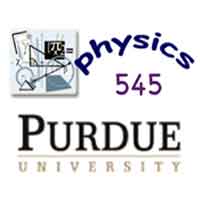New Course: Solid State Physics
Prof. Carlson is teaching a new course this semester, entitled Solid State Physics.
Here is a taste of the new course, which has a separate podcast in iTunes. Search podcasts for Carlson to find the new one, which hopefully will appear in the directory structure of iTunes soon.
Lecture 1 of Solid State Physics: The Failure of Reductionism
Reductionism is the idea that by breaking things into their smallest constituents, we will learn all about them. For example, we might want to learn about solids by breaking them into atoms, then learn about the atoms by breaking them into the constituent electrons and nuclei, and so on. But reductionism is merely a philosophy handed down to us by the Greeks -- is it really correct? New ideas in the field point toward the inadequacy of reductionism, and lead to "emergence" as a better paradigm for gaining knowledge in condensed matter/solid state physics. Emergence is the idea that when many particles get together, new phenomena appear which are not encoded in the microscopic laws, and in fact are independent of the microscopic laws. For example, all solids are hard, regardless of what atoms are in them. Likewise, if we changed the microscopic laws, by changing, say, the shape of the Coulomb potential, we'd still get solids that are hard. That means hardness, and many properties like it, is not caused by the underlying microscopic laws, but rather is caused by deeper physics. It turns out in fact that it's related to symmetry.
Also, find out the difference between correct and useful.
Solid State Physics Lecture Blog
Here is a taste of the new course, which has a separate podcast in iTunes. Search podcasts for Carlson to find the new one, which hopefully will appear in the directory structure of iTunes soon.
Lecture 1 of Solid State Physics: The Failure of Reductionism
Reductionism is the idea that by breaking things into their smallest constituents, we will learn all about them. For example, we might want to learn about solids by breaking them into atoms, then learn about the atoms by breaking them into the constituent electrons and nuclei, and so on. But reductionism is merely a philosophy handed down to us by the Greeks -- is it really correct? New ideas in the field point toward the inadequacy of reductionism, and lead to "emergence" as a better paradigm for gaining knowledge in condensed matter/solid state physics. Emergence is the idea that when many particles get together, new phenomena appear which are not encoded in the microscopic laws, and in fact are independent of the microscopic laws. For example, all solids are hard, regardless of what atoms are in them. Likewise, if we changed the microscopic laws, by changing, say, the shape of the Coulomb potential, we'd still get solids that are hard. That means hardness, and many properties like it, is not caused by the underlying microscopic laws, but rather is caused by deeper physics. It turns out in fact that it's related to symmetry.
Also, find out the difference between correct and useful.
Solid State Physics Lecture Blog

